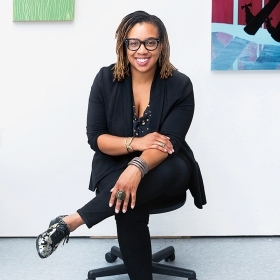Karen Petrulakis
“I really love a higher-ed practice, because it’s relevant, and you feel like you’re doing something that’s really worthwhile,” says Karen Petrulakis, who became Wellesley’s first general counsel last summer.
Photo by Richard Howard
When Karen Petrulakis was chief deputy general counsel at the University of California, a dizzying array of legal issues would land on her desk every day. At any given time, the university would have 600 open cases in litigation, on subjects ranging from the First Amendment rights of students to medical malpractice cases at university hospitals to safety issues in laboratories to the repatriation of Native American remains found on campus.
“I really love a higher-ed practice, because it’s relevant, and you feel like you’re doing something that’s really worthwhile, in a way that sometimes you don’t always feel when you’re in a law firm and you’re representing business entities who are having a contract dispute,” says Petrulakis, who became Wellesley’s first general counsel last summer.
Petrulakis was drawn to Wellesley by its reputation for excellence, and by President Paula Johnson. “She’s a remarkable person because she is so brilliant in many ways, and so impressive. … But at the same time, she’s very accessible,” says Petrulakis. “I think it’s really important as a lawyer to feel like you can have a relationship with the leadership of the institution, because then you can have an open dialogue.”
For Petrulakis, lawyering runs in the family. Her father practices estate planning and probate and business law, and she grew up helping out in the office on the weekends. He loves his work and says he never wants to retire, and indeed, at almost 90, he still works 11 or 12 hours a day, now with Petrulakis’s brother, who is also a lawyer.
‘I think it’s really important as a lawyer to feel like you can have a relationship with the leadership of the institution, because then you can have an open dialogue.’
—Karen Petrulakis
There is a big difference between practicing law at a large university system and a small liberal arts college, Petrulakis says. “[At UC] we had 10 campuses, five major medical centers, 12 hospitals, three national labs—a huge operation. … We also had more than 100 lawyers across the system helping to manage all of that work, and many outside counsel and other departments managing it. It was great experience, because I do feel that I’ve seen almost everything at least once before,” she says.
Petrulakis notes that there is a trend among small liberal arts colleges to bring counsel in house instead of relying on outside firms, in part because of the increasingly complex legal landscape colleges must navigate. “You can rely on outside counsel, but the value of in-house counsel is that you’re a part of the whole community. So you understand the culture better and the particular needs better,” she says.
Since Petrulakis has arrived at Wellesley, she’s been visiting members of the community to get a sense of how they are currently handling legal and compliance issues. She had heard from colleagues who had also been the first general counsel at their institutions that there can be “some discomfort with a lawyer coming in,” she says. At Wellesley, she has found the opposite. “Pretty much everyone has said, ‘Oh, I’m so glad you’re here. So what do you want to talk about? Let me give you my list of things I want to talk about,’” she says.
On her end, Petrulakis is excited to be a one-woman legal shop at Wellesley. “At my old job, a lot of the time I was managing big teams of other people and managing crises. What I’m really loving so far is getting back to being a lawyer, and being an advisor and a counselor, and getting a little deeper into the law. Not just making decisions on big settlements or that kind of thing, but actually digging in and learning the law,” she says.

